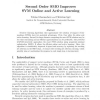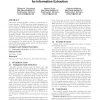972 search results - page 45 / 195 » Using Preference Order in Ontologies |
113
click to vote
NECO
2008
15 years 2 months ago
2008
Iterative learning algorithms that approximate the solution of support vector machines (SVMs) have two potential advantages. First, they allow for online and active learning. Seco...
126
click to vote
ACOM
2004
Springer
15 years 7 months ago
2004
Springer
In this paper, we will consider the alignment of heterogeneous ontologies in multi agent systems. We will start from the idea that each individual agent is specialized in solving ...
136
click to vote
CMS
2006
15 years 3 months ago
2006
This paper presents a model for delegation based on partial orders, proposing the subclass relation in OWL as a way to represent the partial orders. Delegation and authorization de...
103
click to vote
WWW
2009
ACM
16 years 3 months ago
2009
ACM
This paper presents SOFIE, a system for automated ontology extension. SOFIE can parse natural language documents, extract ontological facts from them and link the facts into an on...
121
click to vote
SEMWEB
2009
Springer
15 years 9 months ago
2009
Springer
The growing importance of ontology mapping on the Semantic Web has highlighted the need to manage the uncertain nature of interpreting semantic meta data represented by heterogeneo...


